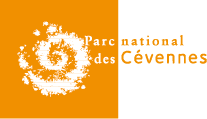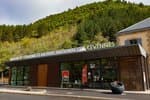From gorge to Causse in the land of the vultures (Day 2).

Le Rozier GR (long-distance hiking path)
GR (long-distance hiking path) GRP (regional long-distance hiking path)
GRP (regional long-distance hiking path)
From gorge to Causse in the land of the vultures (Day 2).
Difficult
6h
22,1km
+1173m
-661m
Roaming
Embed this item to access it offline
The starting-point of the trail, on the cliff edge, is overlooked by two monoliths: the Vase de Sèvre and the Vase de Chine. It also crosses the site of the Arches of Saint-Pierre, with its natural arches and some archaeological remains, which give it an unreal atmosphere. In Rieisse, you have the choice of admiring the panoramic views at the Roc des Hourtous.
6 points of interest

Capluc - NT  History
HistoryCapluc
Capluc was once a defensive and surveillance site, with a castle that (like many of the village’s houses) no longer exists. Some of the houses were renovated once a track suitable for motor vehicles was opened to the hamlet. The name Capluc is believed to come from cap and luz, meaning head and light, thus symbolising the place illuminated by the first rays of the rising sun.
Capluc et son rocher - NT AgricultureCapluc and its terraces
As you leave Capluc, you become aware of how the site, which at first sight seems barren, has in fact been shaped by humans. All of this south-facing slope, which is protected by the tall dolomite cliffs, was farmed using terraces (grains, fruit trees, grapevines). Temperatures are so favourable that the most southern Mediterranean vegetation of the region grows here (narrow-leaved ash, jasmine, Montpellier maple, holm oak, etc.).
Les corniches de la Jonte - nathalie.thomas  Landscape
LandscapeBalcon du vertige (vertigo balcony)
This site, almost 400m above the bed of the Jonte, deserves it name. It is the only spot on the walk from which you have such breathtaking views over the gorge. Opposite you is the Causse Noir, with a heavily fissured rock in the foreground, the Ranc del Pater, on which remain some wall sections of Saint Michael’s hermitage (former château of Montorsier). The tall rectangular cliff on its right is known as Roc Fabié. If you lean forwards, you can see, from upstream to downstream, La Caze and Le Truel hamlets, and below you the Maison des Vautours (vulture belvedere), which was opened in 1998 and traces the local history of vultures.
Le vautour moine - nathalie.thomas  Fauna
FaunaVultures
You are close to the historic site where the griffon vulture was reintroduced from 1982 onwards. Since then, the cinereous vulture (1992) and the bearded vulture (2012) have also been reintroduced. The Egyptian vulture returned of its own accord in 1986. It nested locally in 1997, but it remains rare and very localised in this region. In the Mediterranean basin, the presence of vultures is associated with sheep farming and herd mortality.
Grotte de l'homme mort - Nathalie Thomas  History
HistoryL'Homme-Mort (Dead Man’s) Cave
In 1867 Dr Barthélémy Prunières and Prof Paul Broca discovered some 50 human skeletons from the Chalcolithic or Copper Age (2,200 to 1,800 BC) in this cavity with its almost round entrance. It was the first ever discovery in France of skulls bearing signs of trepanning-style lesions that were in the process of scarring over. Trepanning was carried out using a flint drill. The surgeon operated rather brutally to begin with, but once the cancellous bone had been penetrated, he seems to have drilled into the internal table of the skull bone more carefully. The individuals treated in this way were normally adults.
In some cases, where the skull had previously been staved in, the purpose was probably to relieve the injury.
Rougequeue noir - © Chantal Daquo  Fauna
FaunaBlack redstart (Phoenicurus ochruros)
A hyperactive on its perch. With its long pointed wings, it flutters very rapidly, swallowing insects in the process. It has difficulty hiding its agitation as it perches in well-exposed places, rapidly flexing its legs and moving its tail as if it has the hiccups.
Description
At the car park by the church in Le Rozier, go left towards the D 996 and take the path that goes uphill on the right towards the Rocher de Capluc – the GR 6 (waymarked white and red) – and joins up with the GR® de Pays.
1 – Leave the GR®6 for the GRP® on the right (waymarked yellow and red) which goes via the Jonte cliff edges.
2 – Take the track on the right that goes towards Cassagne (waymarked white and red again) and stay on it until you reach the path to the Arches of St-Pierre.
3 – Leave the track for the small path that crosses the arches and comes to a small road (waymarked white and red). Cross the road to reach the hamlet of La Viale.
4 – Go left and uphill again to St-Pierre des Tripiers; go through the village passing in front of the church.
5 – As you leave the village, at the cross, turn left to follow variant #1 of the GRP®Tour du Causse Méjean (waymarked yellow and red).
6 – When you reach the D 16 road, turn right onto it for 1 km.
7 – Go left and then take an immediate right to reach the hamlet of Rieisse.
1 – Leave the GR®6 for the GRP® on the right (waymarked yellow and red) which goes via the Jonte cliff edges.
2 – Take the track on the right that goes towards Cassagne (waymarked white and red again) and stay on it until you reach the path to the Arches of St-Pierre.
3 – Leave the track for the small path that crosses the arches and comes to a small road (waymarked white and red). Cross the road to reach the hamlet of La Viale.
4 – Go left and uphill again to St-Pierre des Tripiers; go through the village passing in front of the church.
5 – As you leave the village, at the cross, turn left to follow variant #1 of the GRP®Tour du Causse Méjean (waymarked yellow and red).
6 – When you reach the D 16 road, turn right onto it for 1 km.
7 – Go left and then take an immediate right to reach the hamlet of Rieisse.
- Departure : Le Rozier
- Arrival : Rieisse
- Towns crossed : Le Rozier, Saint-Pierre-des-Tripiers, Massegros Causses Gorges, Hures-la-Parade, and La Malène
Forecast
Altimetric profile
Recommandations
Make sure your equipment is appropriate for the day’s weather conditions. Remember that the weather changes quickly in the mountains. Take enough water, wear sturdy shoes and put on a hat. Please close all gates and barriers behind you.
Caution: patous (livestock guard dogs) on the plateau between La Volpilière and Rieisse! Seek advice on how to behave near these dogs from tourist offices and National Park information centres.
Caution: patous (livestock guard dogs) on the plateau between La Volpilière and Rieisse! Seek advice on how to behave near these dogs from tourist offices and National Park information centres.
Is in the midst of the park
The national park is an unrestricted natural area but subjected to regulations which must be known by all visitors.
Information desks
Tourism'house and national Parc at Florac
Place de l'ancienne gare, N106, 48400 Florac-trois-rivières
This office is part of the National Park's associated tourist-information network, whose mission is to provide information on, and raise awareness of, the sites and events as well as the rules that must be observed in the National Park's central zone.
On site: exhibitions, video projections, events and shop Open year-round
Transport
Parking route de Capluc (Capluc road car park)
Bus line "Florac Ste-Enimie Le Rozier", every day in July and August
https://lio.laregion.fr/IMG/pdf/oc-1903-fhbus-48-258-3v_bd_04_.pdf
Bus line Millau Peyreleau le Rozier Meyrueis, all year
https://lio.laregion.fr/IMG/pdf/oc-1907-fhbus_12-215_4v_bd_04_.pdf
Bus line "Florac Ste-Enimie Le Rozier", every day in July and August
https://lio.laregion.fr/IMG/pdf/oc-1903-fhbus-48-258-3v_bd_04_.pdf
Bus line Millau Peyreleau le Rozier Meyrueis, all year
https://lio.laregion.fr/IMG/pdf/oc-1907-fhbus_12-215_4v_bd_04_.pdf
Access and parking
Le Rozier, on the D 996.
Parking :
Car park by the church in Le Rozier Car park by the Crédit Agricole cash machine
Calculateur d'itinéraire Lio
Utilisez le calculateur liO pour organiser votre trajet en région Occitanie.
Autres régions
Calculez votre itinéraire en Auvergne Rhône Alpes sur Oùra
Biodiversité autour de l'itinéraire
Source
Maison du tourisme et du Parc national, Florachttp://www.cevennes-parcnational.fr/

Parc national des Cévenneshttp://www.cevennes-parcnational.fr/
Report a problem or an error
If you have found an error on this page or if you have noticed any problems during your hike, please report them to us here:

